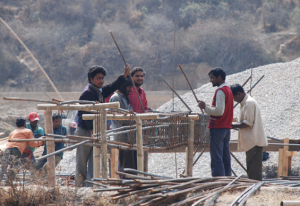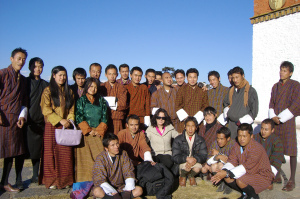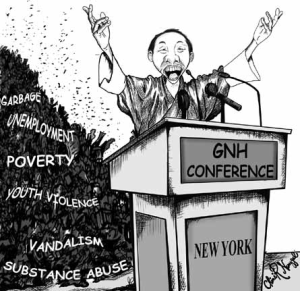Lisa Napoli's Blog, page 8
April 12, 2012
Click to support @READGlobal and help build libraries in #Bhutan

Kids at the READGlobal Library in Ura, Bhutan
Announcing: A great promotion from our friends at Books for Better Living.
Click to like their Facebook page and Random House will give a dollar to READGlobal. READ is the nonprofit for which I and a number of friends have been working to raise money; it’s a great organization that builds libraries in the Himalayas and most recently in Bhutan. Please spread the word!








How Bhutan’s dependence on Indian workers drains rupee
 It’s fascinating to read that the swirl of economic trouble facing Bhutan right now has to do, in part, with dependence on Indian workers to do jobs Bhutanese don’t want to do: Namely, construction.
It’s fascinating to read that the swirl of economic trouble facing Bhutan right now has to do, in part, with dependence on Indian workers to do jobs Bhutanese don’t want to do: Namely, construction.
Not only are there parallels to our situation in the US with Mexican immigrants. (Bhutanese often turn to outsiders for domestic help too, as they do in this country.) More pointedly is the tragic irony of the long-standing refugee situation surrounding Bhutan, in which people of Nepalese descent were pushed out of the country years ago.
Those people had come into the country years ago to work the land, and to help in the building of Bhutan’s infrastructure as it was started over forty years ago. Many were granted land and citizenship; however, many others were not.
When Bhutan began free health care and schooling in the late eighties, and with the potential threat of a political uprising that would threaten the monarchy, the Nepalese were forced out.
Some readers have asked how to refer to those refugees. Some were born in Bhutan. Others were born in Nepal. Coming up with a catch-all word to describe the people in camps who are now being resettled (largely in the US) is a challenge. I faced this challenge last summer in Tucson when I first met some of the resettled people face to face. And I write about it in the new afterward of Radio Shangri-La.
Anyway, here’s the article:
How Bhutan’s dependence on Indian workers drain rupee
Posted: 10 Apr 2012 09:33 AM PDT
The rupee crisis in the country has brought to light another side of Bhutan’s dependence on India. The country’s booming construction industry is heavily dependent on India for workers. Ministry of Labour and Human Resources recently reported that Bhutan is currently hiring 55,551 Indian workers. The wages paid to each one of them get converted into rupee.
Rupee spent on expatriate workers
According to the 2010 and 2011 annual report of Royal Monetary Authority (RMA), the huge expatriate labour force imported to work in the construction industry has been one of the major causes for rupee outflow. The report says that the worth of import of construction and installation-related services, mostly from India, increased to Nu 1.2 billion between 2010 and 2011.
Such services, related to the development and maintainance of major hydropower projects, constituted 22.9 percent of the total service imports for the fiscal year.
Meanwhile, the construction of new hydropower projects has also resulted in an increase in the import of other business services in engineering and other technical fields.
The overall deficit in other business services like accounting and architecture increased to Nu 800.5 million between 2010 and 2011.
The boom in hydropower, private construction and other such activities has increased the inflow of expatriate workers resulting in a huge increase in payments made to them. It amounted to Nu 2.2 billion in the 2010-2011 financial year, which is an increase of 75 percent from the previous year.
By the end of 2009-2010 financial year, the import of construction and installation-related services from India reached Nu 1 billion.
The services constituted 24.4 percent of total service imports. They were mostly imported for building and maintenance of Chukha and Punatsangchhu hydropower projects. Additionally, the deficit on other business services in line with the overall economic activity expanded to Nu 637.9 million.
Labour payment problems
After RMA, the Central Bank, tightened rupee withdrawals from the banks, some industries in the country have faced difficulties in paying their laborers.
A senior official at Tashi Group of Companies said that one of the problems the company is facing due to the rupee crunch is payment for contract labourers and contract employees from India.
Apart from some 10 percent of contract employees from India, Tashi Group employs around 40 labourers for packaging and loading, who want to be paid in rupee.
The construction industry, meanwhile, has been hit hard by the rupee crunch since it mostly depends on Indian labourers.
The general secretary of Construction Association of Bhutan, Cheku Drukpa, said the association will discuss the issue during the next round of meeting with Construction Development Board (CDB). “We have no other way of working on this but to take it up with the government through CDB,” he said.
The manager of Phuentshum Foreign Workers Recruitment Agent in Phuentsholing, Durga Raj Gurung, said that, since the rupee crisis started, it has been hard for them to supply the required number of labourers on time.
The agent supplies labourers from Falakata and Cooch Bihar in India. Contractors pay the agent in ngultrums, but Indian suppliers have to be paid in rupees.
Shortage of Bhutanese workers
In 2001, a survey done by the then Ministry of Trade and Industry in collaboration with Bhutan Chamber of Commerce and Industry, UNDP and World Bank showed shortage of skilled field workers as well as managers in the country. The survey covered 100 organisations in the private sector.
The survey pointed out that the main reasons for poor human resource development effort in those companies were lack of incentives from the government, foreign workers being recruited on contract, and availability of trained workers from neighbouring countries.
The 2010 human resource development report said that Bhutan’s dependence on foreign labourers was mainly because Bhutanese people did not want to do low skill, laborious jobs that are low paying.
According to a job prospecting exercise conducted by the labour ministry, by 2013, there will be a high demand for elementary occupations and craft and related trade workers. Elementary occupations mainly include skilled and unskilled labourers.
There will also be requirements for higher managerial posts, professionals and technicians with specific skill requirements. It has been estimated that between 2009 and 2013, Bhutan will need 16,359 workers in the construction sector – 15,163 men and 1,196 women.
Courtesy : Puskar Chhetri/Bhutan Observer








How Bhutan's dependence on Indian workers drains rupee
 It's fascinating to read that the swirl of economic trouble facing Bhutan right now has to do, in part, with dependence on Indian workers to do jobs Bhutanese don't want to do: Namely, construction.
It's fascinating to read that the swirl of economic trouble facing Bhutan right now has to do, in part, with dependence on Indian workers to do jobs Bhutanese don't want to do: Namely, construction.
Not only are there parallels to our situation in the US with Mexican immigrants. (Bhutanese often turn to outsiders for domestic help too, as they do in this country.) More pointedly is the tragic irony of the long-standing refugee situation surrounding Bhutan, in which people of Nepalese descent were pushed out of the country years ago.
Those people had come into the country years ago to work the land, and to help in the building of Bhutan's infrastructure as it was started over forty years ago. Many were granted land and citizenship; however, many others were not.
When Bhutan began free health care and schooling in the late eighties, and with the potential threat of a political uprising that would threaten the monarchy, the Nepalese were forced out.
Some readers have asked how to refer to those refugees. Some were born in Bhutan. Others were born in Nepal. Coming up with a catch-all word to describe the people in camps who are now being resettled (largely in the US) is a challenge. I faced this challenge last summer in Tucson when I first met some of the resettled people face to face. And I write about it in the new afterward of Radio Shangri-La.
Anyway, here's the article:
How Bhutan's dependence on Indian workers drain rupee
Posted: 10 Apr 2012 09:33 AM PDT
The rupee crisis in the country has brought to light another side of Bhutan's dependence on India. The country's booming construction industry is heavily dependent on India for workers. Ministry of Labour and Human Resources recently reported that Bhutan is currently hiring 55,551 Indian workers. The wages paid to each one of them get converted into rupee.
Rupee spent on expatriate workers
According to the 2010 and 2011 annual report of Royal Monetary Authority (RMA), the huge expatriate labour force imported to work in the construction industry has been one of the major causes for rupee outflow. The report says that the worth of import of construction and installation-related services, mostly from India, increased to Nu 1.2 billion between 2010 and 2011.
Such services, related to the development and maintainance of major hydropower projects, constituted 22.9 percent of the total service imports for the fiscal year.
Meanwhile, the construction of new hydropower projects has also resulted in an increase in the import of other business services in engineering and other technical fields.
The overall deficit in other business services like accounting and architecture increased to Nu 800.5 million between 2010 and 2011.
The boom in hydropower, private construction and other such activities has increased the inflow of expatriate workers resulting in a huge increase in payments made to them. It amounted to Nu 2.2 billion in the 2010-2011 financial year, which is an increase of 75 percent from the previous year.
By the end of 2009-2010 financial year, the import of construction and installation-related services from India reached Nu 1 billion.
The services constituted 24.4 percent of total service imports. They were mostly imported for building and maintenance of Chukha and Punatsangchhu hydropower projects. Additionally, the deficit on other business services in line with the overall economic activity expanded to Nu 637.9 million.
Labour payment problems
After RMA, the Central Bank, tightened rupee withdrawals from the banks, some industries in the country have faced difficulties in paying their laborers.
A senior official at Tashi Group of Companies said that one of the problems the company is facing due to the rupee crunch is payment for contract labourers and contract employees from India.
Apart from some 10 percent of contract employees from India, Tashi Group employs around 40 labourers for packaging and loading, who want to be paid in rupee.
The construction industry, meanwhile, has been hit hard by the rupee crunch since it mostly depends on Indian labourers.
The general secretary of Construction Association of Bhutan, Cheku Drukpa, said the association will discuss the issue during the next round of meeting with Construction Development Board (CDB). "We have no other way of working on this but to take it up with the government through CDB," he said.
The manager of Phuentshum Foreign Workers Recruitment Agent in Phuentsholing, Durga Raj Gurung, said that, since the rupee crisis started, it has been hard for them to supply the required number of labourers on time.
The agent supplies labourers from Falakata and Cooch Bihar in India. Contractors pay the agent in ngultrums, but Indian suppliers have to be paid in rupees.
Shortage of Bhutanese workers
In 2001, a survey done by the then Ministry of Trade and Industry in collaboration with Bhutan Chamber of Commerce and Industry, UNDP and World Bank showed shortage of skilled field workers as well as managers in the country. The survey covered 100 organisations in the private sector.
The survey pointed out that the main reasons for poor human resource development effort in those companies were lack of incentives from the government, foreign workers being recruited on contract, and availability of trained workers from neighbouring countries.
The 2010 human resource development report said that Bhutan's dependence on foreign labourers was mainly because Bhutanese people did not want to do low skill, laborious jobs that are low paying.
According to a job prospecting exercise conducted by the labour ministry, by 2013, there will be a high demand for elementary occupations and craft and related trade workers. Elementary occupations mainly include skilled and unskilled labourers.
There will also be requirements for higher managerial posts, professionals and technicians with specific skill requirements. It has been estimated that between 2009 and 2013, Bhutan will need 16,359 workers in the construction sector – 15,163 men and 1,196 women.
Courtesy : Puskar Chhetri/Bhutan Observer








April 10, 2012
Paperback Shangri-La
 The promotion begins! I am grateful.
The promotion begins! I am grateful.
The travel site World Hum is featuring the book (and an interview with me) on its cover, and Jim Benning's thoughtful questions get at the heart of what Radio Shangri-La is and isn't about.
I was honored to be part of a discussion earlier this week about Gross National Happiness and alternate indicators to GDP on my esteemed KCRW colleague Warren Olney's show, To the Point.
And the travel site Longitude wrote a lovely review.
As previously mentioned, the book is now on sale at Target, as well as traditional booksellers, where it has been chosen as an "emerging author pick."
I appreciate the support, too, of friends who are helping to spread the word. I'd love to get this book into the hands of as many people as possible–not because I'll ever make another dime off it, but because I think the messages are important. (Including the story of the Bhutanese refugees, which is under-reported in the mainstream media.)
Bhutan presents many paradoxes and is a beautiful, complicated place that sums up so many of the challenges our world is grappling with right now. I'm honored to have experienced what I have.








April 2, 2012
Tonight on Al-Jazeera English: Me.
In the continuing surreality that is my life, and on the eve of the paperback publication of Radio Shangri-La, I just got a call to appear on Al-Jazeera English tonight at 10pm EST.
 The subject won't surprise you: the Happiness Summit at the UN convened today by the Prime Minister of Bhutan.
The subject won't surprise you: the Happiness Summit at the UN convened today by the Prime Minister of Bhutan.
Speaking of which: You might find this interview with him by the UN News Service interesting.








The reality of happy
You may see some coverage of a "gross national happiness" summit convened today at the United Nations by Bhutan. (Here's my take on it on Forbes.) The idea is to get world leaders talking about incorporating well-being and principles of sustainability into their way of measuring their nation's progress.)
As always, there's much more to the story. Here's a cartoon from the Bhutan Observer that kind of sums up some of what won't come up today (and shows that the newly granted freedom of the press is flourishing there. That's the prime minister at the podium.) It's the reality of today's Bhutan:

Bhutan Observer
And here's the Opposition Leader of Bhutan speaking about the financial crisis that's gripping the nation right now. He's calling on the government to speak out about it.
What's not discussed is the refugee crisis that's haunted Bhutan for over 20 years. Ironically, part of the reason for Bhutan's expulsion of the Nepalese immigrants long ago was economic: They said keeping health care free, schools free, wasn't possible if they let everyone stay.)
None of this is to taunt Bhutan for its flaws (which we here in the west have in abundance.) Most Bhutanese re-coil at the "happy" and "Shangri-la" things, and despise people like me who use the words even in an ironic context as with my book title. I bring it up to underscore that the precepts of a sustainable economy are more difficult to follow than they are to proclaim.
It's not as simple as "being happy." And it's exciting that there's a dialogue about injecting what matters into the way our leaders think.








March 27, 2012
Drop Dead Diva goes to Bhutan : Count the errors!
A casting call for actors in an episode that involves the Kingdom. If you know anything about Bhutan, you'll know this isn't a realistic plot line:
DROP DEAD DIVA, #405, "Happily Ever After" (2 Roles)
Episodic
Sony / Lifetime
1 Hour Series
AFTRA
Draft: March 12, 2012
[image error]
Exec. Producers: Josh Berman, Alex Taub, Neil Meron, Craig Zadan
Writers: Amy Engelberg & Wendy Engelberg
Director: Tim Matheson
Casting Directors: Carol Kritzer, Suzanne Bachman
Location: Peachtree City, GA
Shoot Dates: o/a 4/9 – 4/18
NO PHONE CALLS, PLEASE EMAIL PITCHESSUBMIT ELECTRONICALLY ONLY
[image error]
PLEASE NOTE: SUBMIT EAST INDIAN ACTORS AND ACTRESSES TO PLAY BHUTANESE.
[LEELA PENJORE] Early 20s, Bhutanese (please also submit Eastern Indian). Beautiful, exotic, and sweet. Leela is the fiancee of Prince Sanjay of the Bhutanese Royal family — a man twice her age, whom she does not love. Forced into a marriage that makes her miserable, she's in Los Angeles with the Prince on a diplomatic trip, and attracts Jane's attention when she's found weeping in the ladies room of a restaurant. After convincing Jane that her civil rights are being violated by this hateful marriage, she becomes Jane's client, but winds up tried for sedition against the kingdom of Bhutan…GUEST STAR (2)
[JED AMERIAN] 30s to 40s, Any Ethnicity. A patriot who is imposing and firm in his beliefs, but not a jerk. He represents the State Department and wants to keep the government of Bhutan both happy and pro-America. Though he admires her convictions, he believes that Jane's attempt to prevent Leela's marriage to Prince Sanjay will have disastrous global ramifications. He's determined to oppose her legal actions, and becomes her and Leela's high-powered nemesis, in and out of court…GUEST STAR (13)








March 26, 2012
Americans who love (refugees from) Bhutan

Loves the refugee community
Shirley in Tucson is one of a number of people around the country helping Bhutanese refugees of Nepalese descent who've been resettled in their community. To date, 50-thousand of the people living in camps over the last two decades have been relocated to the United States; about a thousand alone in this desert city.
For the last several years, Shirley has been busily volunteering with several families, helping them acclimate to the strange and vastly different world than the one they left behind. It all started because of her church's involvement in making the resettled people feel welcome.
Shirley functions like a mother or grandmother: helping them set up apartments with donated furniture, taking them to doctor's appointments, hosting them for Christmas, cooking with and explaining the curious wonders of spaghetti and holiday baking. In return, she's enjoying learning about the vastly different culture that's been newly introduced to her city.
She's even gone so far as to host a wedding for one couple in her RV park, and to help with bills when they've been a problem. It's been a struggle for some of the refugees to find work and to adapt to the challenges of their adopted home.
Not only had Shirley not ever visited Bhutan, like many Americans, she barely knew where it was before she met the refugees. Her first introduction to the Kingdom was learning about the atrocities that drove many Bhutanese-Nepalese from the country 20 years ago. She is more focused on helping them succeed than anything else:
"I really love these people and they have so enriched my life!" she says, proudly.








March 23, 2012
Americans who love Bhutan (part 2)

The neighbors weren't happy-at first
As part of an ongoing series, today I introduce a fascinating man whom I've not had the pleasure of meeting. Yet. We have a lot in common, and our stories are very similar. Dr. Richard Scott says he loved volunteering in Bhutan as a doctor so much that when he returned to the US, he built his house in northern Michigan in the distinct style of Bhutanese architecture.
He writes, "Our neighbors were incensed…indicating only log cabins and traditional designs should be built. A white house with a red roof sure stands out and the prayer flags and prayer wheel all pointed to something bad. Now things have changed. People accept my eccentricity."
 How did Dr. Scott and his family come to live in Bhutan over 15 years ago? Again, in his words:
How did Dr. Scott and his family come to live in Bhutan over 15 years ago? Again, in his words:
"I attended a seminar years ago for a week on teaching orthopedic residents. It was an intense area of study for those who had been students but not teachers. Near the end of the conference a friend stopped to talk to me and said he thought I might like to participate in a newly opened program through health volunteers overseas (HVO) in Bhutan. He had apparently trekked there and made connections. At that time there were few foreign physicians except for those from WHO and later I met a German surgeon who had settled in a small town.
 "I thought it would be a great idea but did not follow up until I was at a national convention of the Academy of Orthopedics where HVO had a booth to sign up. I signed up . — so often decisions are made on a spurred moment, which have been sizzling on a back burner—
"I thought it would be a great idea but did not follow up until I was at a national convention of the Academy of Orthopedics where HVO had a booth to sign up. I signed up . — so often decisions are made on a spurred moment, which have been sizzling on a back burner—
"I returned home and informed my wife who said the date was wrong as the kids had too much going on and I needed to change it. She also said we should all go. And we did. My eldest was then a third or fourth year medical student and he came as a rotation that was approved. The others took their books and assignments and some did them. The experience was great for them.
"Bhutan is a long way from Grosse Pointe as it is from LA. My wife went from fear at the driving to Bumthang and the lack of amenities with which we are accustomed, to crying all the way from Thimpu to the airport.
"Two friends went to Bhutan later with Ortho overseas; I had them give a lecture to our group of D.O. orthopedists and their comment is the experience transformed them more than they the health care situation. Some things were not able to be changed.
"One friend, the daughter of our close friends, was in college and came with us. Quiet and observant, she came back and now has gone into a form of divinity school.
"We had the house designed from drawings and a model we brought back once. I found a large coffee table book on the architecture of Bhutan which I gave to our architect. It is solidly made and today a synthetic stucco is used."
Dr. Scott wrote to me after reading Radio Shangri-La and like many of us, is closely following the unfolding events in the Kingdom he came to love.








March 22, 2012
The Dalai Lama's advice for unhappy millionaires: @WSJ
His Holiness tells WSJ reporter Barbara Chai: "….money only brings comfort for our physical needs. Good shelter, good food, good clothes. Money never brings peace of mind. I think through money, you may develop some kind of satisfaction, that's actually just one side. Not complete, holistic. More money, more fear."
But it's much better to see the video here.











